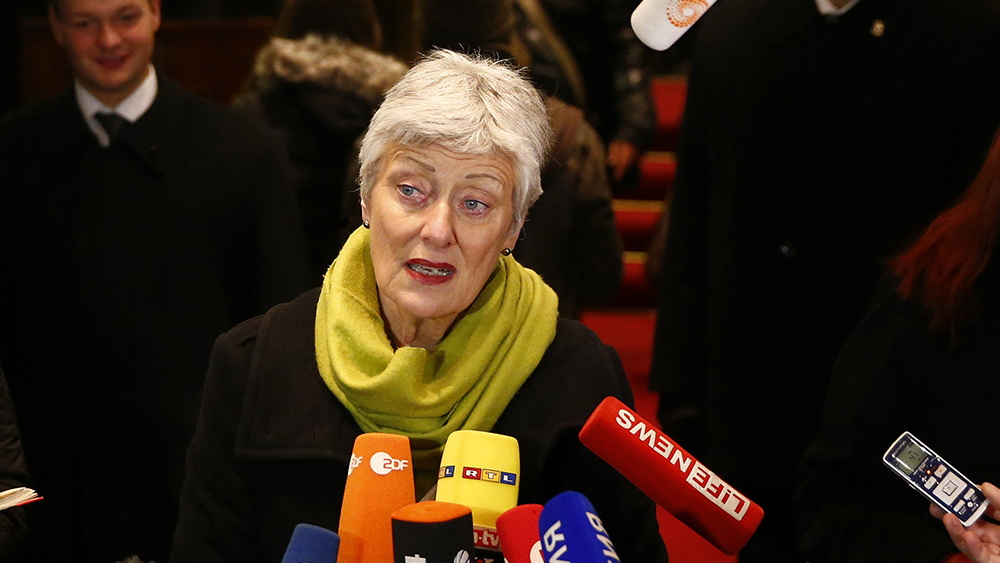The office of Marieluise Beck, a veteran Green member of the Bundestag and vocal critic of Russian President Vladimir Putin, was hacked two years ago by the FSB. Then her party deselected her. Is it time to put two and two together?
Ms. Beck, a computer in your office was hacked in 2014. How did you find out? The German Federal Office for Information Security, or BSI, informed me of suspicious activities they had observed in reference to a computer in my office, and they asked me whether I’d allow them to check the computer in question, which of course I did. I was subsequently informed that the computer had been hacked and malware then known as MiniDuke had been used. I had to find out via Google searches that MiniDuke had been used in the past, against smaller Eastern European countries and US think tanks among other targets. The hacking incident was confirmed to me by Petra Pau, vice president of the German Bundestag from the Left Party, who is in charge of informational security. And that was that. File closed.
MiniDuke was suspected to be of Russian origin even back then. The fact that it targeted a German representative known for her critical views of Vladimir Putin and her support for democrats and opposition figures in countries like Ukraine or Georgia was potentially explosive. Why was the case dealt with so slowly? Several reasons, I presume. First, there’s the legal aspect. No public statement can be issued as long as there is no clear evidence about the origin of the malware. Then there is the fact that Bundestag members and its presidium may have underestimated how determined the intelligence services of an authoritarian state can be when trying to obtain information about German representatives – which would also give them access to foreign activists in contact with those representatives. This is of course highly dangerous in countries where opposition forces face serious repression. And last but not least: There seems to be a far greater outcry over digital spying activities by the United States in the wake of the revelations by Edward Snowden than over hacking attacks from authoritarian states.
With recent reports on Russian interference in the US-election campaign, do you think this has changed now? You know, I have learnt to my surprise that the attack on my office was conducted by the same group that seems to be responsible for the attack on the Clinton campaign – the FSB-controlled hacking group CozyBear, or ATP29. And to my even greater surprise I was not informed about that by the German Bundestag, but by a US news channel.
How so? NBC contacted me and claimed to have been informed by the BSI press office. I then inquired with Ministry for the Interior, which supervises the BSI, why the office would inform a US news channel but not the parliamentarian who was directly affected. The BSI denied having informed NBC, but told me subsequently that they now had the technical means to learn more about MiniDuke and were now sure that the 2014 attack on my office computer was conducted by CozyBear. At the same time, the BSI stressed that it wasn’t within their remit to identify who was responsible for the hacking; that would be the task of the Office for the Protection of the Constitution (BfV), Germany’s domestic intelligence service. The BfV then confirmed to me that they believe the Russian intelligence service to be responsible. Legally, however, this is considered still insufficient, i.e. the evidence does not allow a clear attribution in a legal sense.
Is the latest US intelligence report on Russian interference in the US presidential elections helpful in this regard – and will it raise general awareness? To be honest, I don’t think so. There’s still insufficient awareness of the political context of those hacks. One reason might be that too many still cannot imagine that the information that could be obtained would be of any interest to the Russian side. Also, most still vastly underestimate the sophisticated network for hacking and manipulating public opinion that Russia has established in Germany. In my political work, I come across so much political engineering. And the massive activity of trolls was underestimated for a long time – or not even recognized as troll activity. For far too long, their activities were thought to be a genuine expression of dissatisfaction with the reporting by German media about the invasion of eastern Ukraine, or a supposedly too critical attitude toward Russia.
Aside from the trolls who flooded the so-called “established media” with comments immediately after the annexation of Crimea, do you see “homegrown activities” as well? Take the so-called “Monday demonstrations”, supposedly in the tradition of the “Monday demonstrations” against the Communist East German government in 1989: In 2004, they started as left-wing protests against social injustices in the eastern city of Leipzig, but in the wake of the Ukraine conflict in spring 2014 they transformed into aggressive, right-wing, xenophobic, populist demonstrations under the umbrella “Vigils for Peace.” It’s interesting to note that Jürgen Elsässer, for instance, the editor in chief of Compact magazine, which thrives on pro-Russian conspiracy theories, is a former left winger – a good example for this new “Querfront,” amalgamating the extreme fringes of the left and right. These forces aggressively attacked those who spoke out against Russian aggression in Ukraine as “warmongers” – myself included.
Did the fact that you were defamed with the term “warmonger” also play a role in your recent deselection for the 2017 elections after more than 26 years in the Bundestag? It would be very hard to prove causality. But it’s true that in some parts of our party – and not the most irrelevant ones – the slur “Beck is a warmonger” took hold, and was spread through social media as well. I was told that in leading circles of the Green party, in my hometown and my constituency in Bremen, there was concern that my candidacy would chase away more left wing voters. There was obviously no urge to support a Green member of the Bundestag who works with Russian and Ukrainian dissidents, with democrats and civil rights activists, in order to send a clear signal. The Russian human rights group Memorial, the democratic “Eurooptimists” forces in the Ukrainian parliament, members of the marginalized Belarusian democratic opposition – they all wrote supporting letters, but they had no effect.
The hackers working for Russian intelligence may have targeted information about your contact with political figures critical of the Putin regime in Ukraine, Georgia, Russia itself, or Chechnya – all regions where you are active. Is there any indication that those activists were harmed? I’d be devastated if I personally would have put people in danger in those countries or regions. So far I can say that this hasn’t happened – yet. I can say, however, that Natalya Estemirova, whom I knew very well and whom I supported in her struggle against Ramsan Kadyrov, was brutally murdered in 2009. I sincerely hope that it was not our communication that had put her in danger. Her murder has never been solved, by the way.
Why do you think Russian interference so far has caused much less of a stir than the revelations about the NSA spying activities? The rational explanation may be that it is more outrageous, of course, to be betrayed by friends, namely the US. But I believe it has much more to do with deep anti-Western sentiments – anti-modern, anti-representative democracy, anti-capitalist, anti-homosexuality, etc. These feelings are to be found both on the right and left fringes of our society. In polls, we see almost equal sympathy, or even support, for Putin’s policy or his persona among voters of the Left Party and the right wing Alternative für Deutschland (AfD). The latter prefers a “strong leadership” to the consensus-seeking work of parliaments, demands protectionism as a tool against globalization, wants to return to old social patterns, to traditional “family values”, to homophobia. In short, they are longing for a less complex, almost pre-modern world. This ideological mix has been promoted by the Kremlin for a long time, and has found resonance among both left- and right-wings fringes – and it should worry the left greatly that it also finds resonance in their own camp.
Do you think that the German public will show “democratic resilience” against this ideological onslaught? I very much hope that Germany’s middle-class center, its bürgerliche Mitte, will hold. It clearly gets dangerous when the center starts to crack. We therefore need policies that strengthens the center regardless of our political differences. “We”, the center, may fight over the necessity of humanitarian interventions, of employing military means, but we are united in the conviction that we need to deal with the complexities of modernity in a complex way – and that simple “truths” or “solutions” based on fear-mongering are not the right answers.
Marieluise Beck was one of the founders of the Green party, and first entered the Bundestag in 1983. In her work on foreign affairs she has played an important role in supporting opposition figures and democratic forces in Eastern Europe and Russia. With her deselection, the Bundestag will lose one of its most vocal critics of Vladimir Putin.
Read more in the Berlin Policy Journal App – January/February 2017 issue.








